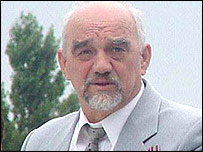
MOSCOW HOSTS THREE SECESSIONIST LEADERS
Publication: Eurasia Daily Monitor Volume: 3 Issue: 215
By:

Sergei Bagapsh, Eduard Kokoiti, and Igor Smirnov, Russian-installed leaders respectively of Abkhazia, South Ossetia, and Transnistria, conferred with Russian government officials in Moscow on November 16-18, held a joint news conference, and were featured extensively on Russian state television channels.
All three made it clear that by seeking the “independence” of their territories they meant their ultimate affiliation to the Russian Federation (NTV Mir Television, November 19).
In a sign of growing confidence, the trio advertised themselves as “proud to be citizens of Russia.” They also made unusually open statements of loyalty to Russia partly based on Soviet nostalgia: “Moscow remains our capital just as it was in Soviet times. For us, this is our capital whether one likes this fact or not,” Bagapsh declared (Interfax, November 17). Kokoiti pronounced Georgia guilty of separatism because it withdrew from the Soviet Union, thus losing any title to territorial integrity, in his view (Russian Television Channel One, November 16). Smirnov elliptically but pointedly remarked, “I’ve been in Russia ever since birth” (Interfax, November 17) — a double allusion to his Khabarovsk origins and to the Tiraspol authorities’ view of Transnistria as an outpost of Greater Russia. This acknowledgment will undoubtedly embarrass those OSCE officials who still advocate power-sharing between Chisinau and the Tiraspol leaders supposedly representing left-bank Moldova, even though most of that group are non-natives on mission from Russia.
The trio announced their respective preconditions to a resumption of negotiations with Tbilisi and Chisinau. Thus, Bagapsh ruled out any negotiations until all Georgian “troops” [by which the Abkhaz mean Georgian police] and Georgian administration withdraw from the upper Kodori Valley. Moreover, he warned, “Any envoy who goes to upper Kodori will not be received in Abkhazia, irrespective of the country he represents” — a warning perhaps immediately intended for U.S. Deputy Assistant Secretary of State Matt Bryza who was holding talks in Tbilisi and en route to Sukhumi. The restoration of Georgian control in upper Kodori “has buried the process of negotiations,” Bagapsh declared (Interfax, November 16-18), reflecting Sukhumi’s greater intransigence in the wake of the UN Security Council’s Western-approved resolution in October that criticized Georgia’s Kodori move.
Smirnov demanded the signing of an agreement in the 5+2 framework, recognizing Transnistria’s “right” to conduct its own foreign trade as a precondition to resuming negotiations — a Moscow-backed demand known to be unacceptable to the European Union and the United States as well as to Chisinau. For his part, Kokoiti named his precondition to a proposed meeting with Georgian President Mikheil Saakashvili: the signing of an agreement on the mutual renunciation of force. Tskhinvali wants such an agreement in the form of a treaty-type document that would imply Georgia’s recognition of South Ossetia by Georgia — a tactic that Sukhumi also uses vis-à-vis Tbilisi.
Kokoiti and Smirnov accused Georgia and Moldova, respectively, of practicing or intending “fascism” and “genocide;” and Bagapsh added the unsubstantiated Russian charge of “militarization” regarding Georgia, an excuse for the actual militarization of Abkhazia.
Russian State Secretary and Deputy Minister of Foreign Affairs Grigory Karasin received Kokoiti for “congratulations with the convincing victory” in the November 12 referendum on “independence” and the “presidential” election, noting “unanimous support” in South Ossetia for Kokoiti and independence. The Russian MFA’s communiqué curtly dismissed the “so-called alternative voting” and insisted on maintaining “the existing format” for any future negotiations. In tune with the hosts, Kokoiti insisted that Russian “peacekeeping” troops will remain in South Ossetia “until the full resolution of the conflict” — that is, an open-ended presence.
The trio declared in unison that they did not need a Kosovo precedent or model to justify their secession. Indeed they took pains to distance themselves from the Kosovo case, arguing that their own cases had greater validity. Smirnov dismissed the Kosovo case as “academic talk….Recognition or non-recognition of Kosovo bears no relation to our state.” Bagapsh would “not in the least compare our movement toward independence with the case of Kosovo,” particularly since the [Moscow-encouraged] Serbian referendum recently decided for Serbia’s territorial integrity. Kokoiti is “not counting on [a precedent in] Kosovo, we have stronger legal and political grounds for recognition than Kosovo does” (Interfax, November 17, 18).
Their political preconditions and accompanying propaganda line, as well as their insouciance about Kosovo, indicate that the secessionist leaderships now behave more confidently than at any time in the past. By the same token they indicate that Moscow has decided to impose a deep freeze on the three sets of negotiations until further notice.




